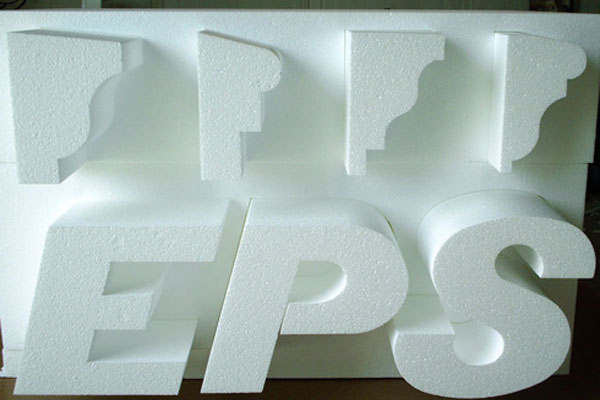Expanded polystyrene (EPS) is commonly used in various applications in industry and building systems due to its properties such as low weight, thermal conductivity, water and moisture resistance, high durability, sound absorption, and low thermal conductivity. This product is used in building structures as the main material of insulation panels. Some of those structures may be exposed to dynamic loads during their lifetime, such as shocks from wind movement; Therefore, understanding the properties of expanded polystyrene (EPS) is essential to predict the performance of EPS insulation panels.
In this paper, the data of EPS stress and tensile tests such as strength, Young’s modulus, and also the thermal properties of this material such as heat absorption capacity, etc. are presented.
Physical properties of expansion polystyrene (EPS)
A wide range of physical properties of expanded polystyrene (EPS) in combination with engineering considerations makes the process of designing cost-effective food packaging more flexible.
The table below shows the most important physical properties of EPS.
| Property | The unit | Amount |
| Density | g/cc | 0.0031 – 3.5 |
| Fillers | % | 0.3 – 10.5 |
| Water absorption | % | 0.03 – 9 |
| Particle size | µm | 100 – 3150 |
| Water vapor treatment | g/m2/day | 50 – 200 |
| Viscosity | cP | 1.65 – 1.7 |
| Permeability to all types of vapors | % | 0.5 – 3.5 |
| Maximum moisture content | % | 0.2 – 0.5 |
| Steam pressure | bar | 0.685 |
Mechanical properties of expanded polystyrene (EPS)

EPS
Expanded polystyrene (EPS) has high mechanical strength against pressure; For this reason, it is very suitable for products that need to be put under a lot of pressure. In general, the strength and mechanical properties of this material depend on the particle size and geometry of the molded part, process conditions, and density, and increase with increasing density.
Expanded polystyrene (EPS) has high dimensional stability and retains its appearance properties in different environmental conditions.
The cellular structure of expanded polystyrene (EPS) makes it essentially impermeable to water. However, EPS may absorb moisture when completely immersed in water due to the presence of fine channels in its structure.
Although molded polystyrene is almost impermeable to water, it is relatively permeable to vapor pressure differences. Vapor permeability is a function of the density and thickness of the material, but in general, water and vapor do not affect the mechanical properties of EPS. The basic properties of expanded polystyrene (EPS) foams are largely a function of density. This allows manufacturers to adjust the exact performance required with a simple process change without having to redesign the tool.
The following table shows the values of the mechanical properties of expanded polystyrene (EPS).
| Property | The unit | Amount |
| Tensile modulus or Young’s modulus (elasticity) | GPa | 0.0065 – 2.65 |
| Tensile strength | MPa | 0.075 – 3 |
| Tensile strength at the fracture point | MPa | 47.1 – 51 |
| Elongation at the breaking point | % | 0.124 – 0.3 |
| Creeping strength | MPa | 0.06 – 0.3 |
| Flexural strength at the breaking point | cP | 6.9 – 14.1 |
| Tension modulus | GPa | 0.0019 – 0.004 |
| Impact strength | J/cm | 0.216 – 0.245 |
| Compressive strength | MPa | 0.04 – 10.9 |
Thermal properties of expanded polystyrene (EPS)
The cellular structure of expanded polystyrene (EPS) is closed and 98% of this product is composed of air; Therefore, it is expected that this material has a very low thermal conductivity and can act as a good thermal insulator due to the lack of heat transfer. The thermal conductivity of molded polystyrene can be changed by the density and temperature to which it is exposed.
The values in the table below show the thermal properties of expanded polystyrene (EPS).
| Property | The unit | Amount |
| Softness temperature index | g/10 min | 1.8 – 4 |
| Highest operating temperature | °C | 70 – 118 |
| Thermal decomposition temperature | °C | 220 |
| Flash temperature | °C | -56 |
| Flash temperature | °C | 285 |
| Flame spread | mm/min | 1.2 – 136 |
| Thermal conductivity (between 25 ° C to 100 ° C) | W/m. K | 0.027 – 0.045 |
| Deformation temperature in the short term | °C | 100 |
| Softening temperature | °C | 70 |
Electrical properties of expanded polystyrene (EPS)
The volumetric strength of expanded polystyrene (EPS) molded at 73 ° F and 50% r .h is 4 x 1013. Its dielectric strength is approximately 2 kV / mm. EPS molds can be modified with anti-static agents to meet the standards of the electronics and packaging industry.
Chemical properties of expanded polystyrene (EPS)
Water and aqueous solutions of salts, as well as acids and alkalis, do not affect expansion polystyrene (EPS). Also, most organic solvents are not EPS compliant. Other materials of unknown composition should be tested for compatibility with this material. EPS is generally chemically neutral and resistant to bacterial attacks.
It should also be noted that exposure to expanded polystyrene (EPS) in direct sunlight and ultraviolet rays can cause a yellow color on the surface of the material and make the top layer brittle. Expandable polystyrene (EPS) is flammable but can be modified as a fire retardant to reduce its flammability.

